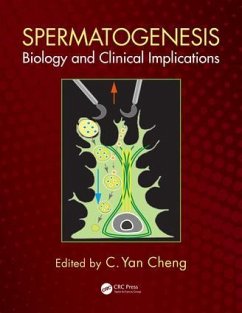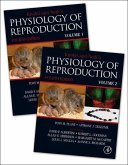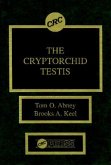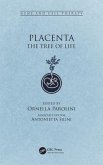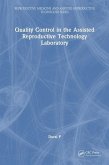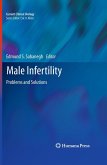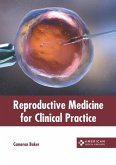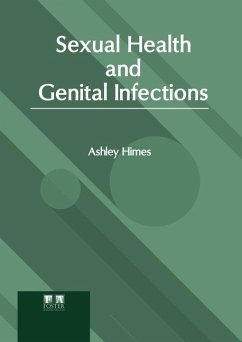Spermatogenesis
Biology and Clinical Implications
Herausgeber: Cheng, C Yan
Spermatogenesis
Biology and Clinical Implications
Herausgeber: Cheng, C Yan
- Gebundenes Buch
- Merkliste
- Auf die Merkliste
- Bewerten Bewerten
- Teilen
- Produkt teilen
- Produkterinnerung
- Produkterinnerung
This is a must read and timely reference work for investigators who are interested in how spermatogenesis is currently understood and the most promising avenues for future research; an Introduction sets the context for the chapter and points out the relevance of the research for basic research scientists and clinicians.
Andere Kunden interessierten sich auch für
![Knobil and Neill's Physiology of Reproduction Knobil and Neill's Physiology of Reproduction]() Knobil and Neill's Physiology of Reproduction541,99 €
Knobil and Neill's Physiology of Reproduction541,99 €![The Cryptorchid Testis The Cryptorchid Testis]() Thomas O. AbneyThe Cryptorchid Testis451,99 €
Thomas O. AbneyThe Cryptorchid Testis451,99 €![Placenta Placenta]() Placenta287,99 €
Placenta287,99 €![Quality Control in the Assisted Reproductive Technology Laboratory Quality Control in the Assisted Reproductive Technology Laboratory]() Durai PQuality Control in the Assisted Reproductive Technology Laboratory148,99 €
Durai PQuality Control in the Assisted Reproductive Technology Laboratory148,99 €![Male Infertility Male Infertility]() Edmund S. Sabanegh (Hrsg.)Male Infertility81,99 €
Edmund S. Sabanegh (Hrsg.)Male Infertility81,99 €![Reproductive Medicine for Clinical Practice Reproductive Medicine for Clinical Practice]() Reproductive Medicine for Clinical Practice157,99 €
Reproductive Medicine for Clinical Practice157,99 €![Sexual Health and Genital Infections Sexual Health and Genital Infections]() Sexual Health and Genital Infections161,99 €
Sexual Health and Genital Infections161,99 €-
-
-
This is a must read and timely reference work for investigators who are interested in how spermatogenesis is currently understood and the most promising avenues for future research; an Introduction sets the context for the chapter and points out the relevance of the research for basic research scientists and clinicians.
Hinweis: Dieser Artikel kann nur an eine deutsche Lieferadresse ausgeliefert werden.
Hinweis: Dieser Artikel kann nur an eine deutsche Lieferadresse ausgeliefert werden.
Produktdetails
- Produktdetails
- Verlag: CRC Press
- Seitenzahl: 278
- Erscheinungstermin: 12. November 2018
- Englisch
- Abmessung: 284mm x 221mm x 18mm
- Gewicht: 1043g
- ISBN-13: 9781498764117
- ISBN-10: 1498764118
- Artikelnr.: 51780285
- Herstellerkennzeichnung
- Libri GmbH
- Europaallee 1
- 36244 Bad Hersfeld
- gpsr@libri.de
- Verlag: CRC Press
- Seitenzahl: 278
- Erscheinungstermin: 12. November 2018
- Englisch
- Abmessung: 284mm x 221mm x 18mm
- Gewicht: 1043g
- ISBN-13: 9781498764117
- ISBN-10: 1498764118
- Artikelnr.: 51780285
- Herstellerkennzeichnung
- Libri GmbH
- Europaallee 1
- 36244 Bad Hersfeld
- gpsr@libri.de
C. Yan Cheng Ph.D. is a senior scientist at the Population Council's Center for Biomedical Research, New York, affiliated with the Council's Reproductive Health program, where his research focuses on developing new male contraceptive methods through a better understanding of male fertility and infertility, and on the biology of the blood-testis barrier and the mechanism by which environmental toxicants induce testicular injury. He serves as an ad-hoc reviewer of grant proposals submitted to the National Institutes of Health's Cellular, Molecular and Integrative Reproduction Study Section and the Endocrinology, Metabolism, Nutrition and Reproductive Sciences Study Section. He holds a Ph.D. in biochemistry and cell biology from the University of Newcastle, New South Wales, Australia, after an undergraduate degree from the Chinese University of Hong Kong. His research has been supported by the National Institute of Child Health and Human Development, National Institutes of Health, for the last three decades. He has published more than 400 peer-reviewed papers. He was awarded the Richard E. Weizman Memorial Award from the Endocrine Society in 1988 and received the Best Scientific Paper Award from the American Society of Andrology in 1997. He also served as the Editor-in-Chief of the peer-review journal Spermatogenesis from 2011 through 2016.
Preface
Contributors
1. Golgi apparatus regulation of differentiation: A case study for male
germ cells of the rat testis
Louis Hermo, Regiana L. Oliveira, Charles E. Smith, Catherine E. Au, and
John J. M. Bergeron
2. Androgen regulation of spermatogenesis
William H. Walker
3. Testicular immunoregulation: The role of Tyro3, Axl, and Mer receptor
tyrosine kinases and pattern recognition receptors
Fei Wang, Qian Jiang, and Daishu Han
4. Inflammation and Spermatogenesis
Maria Susana Theas, Patricia Verónica Jacobo, Cecilia Valeria Pérez, Vanesa
Anabella Guazzone, and Livia Lustig
5. Junctional adhesion molecule (JAM) family: Recent findings and their
role and regulation in spermatogenesis
Kun Huang and Wing-Yee Lui
6. Sertoli cell immune regulation within the testis
Gurvinder Kaur, Kandis Wright, Robin Hannah Greer, Karl Mueller, Allan
Haynes, and Jannette M. Dufour
7. The mitotic phase of spermatogenesis: Recent advances and perspectives
Kin Lam Fok and Hsiao Chang Chan
8. Genetics of mammalian meiosis
Fang Yang and P. Jeremy Wang
9. Roles of membrane and nuclear estrogen receptors in spermatogenesis
Paul S. Cooke, Manjunatha K. Nanjappa, Sergei G. Tevosian, and Rex A. Hess
10. Regulation of fertility and infertility in humans
Nahid Punjani, Ryan Flannigan, and Peter N. Schlegel
11. Male infertility: Evaluation and treatment
Ryan Flannigan and Marc Goldstein
12. Effects of chemical pollutants on spermatogenesis and implications in
male infertility
Chris KC Wong
13. Advances in our understanding of human spermatogenesis
Qing Wen, Elizabeth I. Tang, Tito Jesus, Bruno Silvestrini, and C. Yan
Cheng
14. A look into the testis as a reservoir for HIV and ZIKV-A reproductive
biologist's perspective
Elizabeth I. Tang, Christopher L. Robinson, Chi Nok Chong, Shuibing Chen,
and C. Yan Cheng
15. Cytoskeletons (F-actin) and spermatogenesis
Liza O'Donnell and Peter G. Stanton
16. Roles of mTOR signaling in spermatogenesis
Lan Ye and Ke Zheng
17. Does planar cell polarity matter during spermatogenesis?
Linxi Li, Haiqi Chen, Qingquan Lian, Ren-Shan Ge, and C. Yan Cheng
18. Computational characterization and integrative analysis of proteins
involved in Spermatogenesis
Pranitha Jenardhanan, Manivel Panneerselvam, and Premendu P. Mathur
19. Effects of chemical exposures on testis cell-cell interactions and
endocrine function
Rachel C. Knight, Jennifer R. Panizzi, and Benson T. Akingbemi
20. Environmental toxicants on Leydig cell function
Leping Ye, Xiaoheng Li, Xiaomin Chen, Qingquan Lian, and Ren-Shan Ge
Index
Contributors
1. Golgi apparatus regulation of differentiation: A case study for male
germ cells of the rat testis
Louis Hermo, Regiana L. Oliveira, Charles E. Smith, Catherine E. Au, and
John J. M. Bergeron
2. Androgen regulation of spermatogenesis
William H. Walker
3. Testicular immunoregulation: The role of Tyro3, Axl, and Mer receptor
tyrosine kinases and pattern recognition receptors
Fei Wang, Qian Jiang, and Daishu Han
4. Inflammation and Spermatogenesis
Maria Susana Theas, Patricia Verónica Jacobo, Cecilia Valeria Pérez, Vanesa
Anabella Guazzone, and Livia Lustig
5. Junctional adhesion molecule (JAM) family: Recent findings and their
role and regulation in spermatogenesis
Kun Huang and Wing-Yee Lui
6. Sertoli cell immune regulation within the testis
Gurvinder Kaur, Kandis Wright, Robin Hannah Greer, Karl Mueller, Allan
Haynes, and Jannette M. Dufour
7. The mitotic phase of spermatogenesis: Recent advances and perspectives
Kin Lam Fok and Hsiao Chang Chan
8. Genetics of mammalian meiosis
Fang Yang and P. Jeremy Wang
9. Roles of membrane and nuclear estrogen receptors in spermatogenesis
Paul S. Cooke, Manjunatha K. Nanjappa, Sergei G. Tevosian, and Rex A. Hess
10. Regulation of fertility and infertility in humans
Nahid Punjani, Ryan Flannigan, and Peter N. Schlegel
11. Male infertility: Evaluation and treatment
Ryan Flannigan and Marc Goldstein
12. Effects of chemical pollutants on spermatogenesis and implications in
male infertility
Chris KC Wong
13. Advances in our understanding of human spermatogenesis
Qing Wen, Elizabeth I. Tang, Tito Jesus, Bruno Silvestrini, and C. Yan
Cheng
14. A look into the testis as a reservoir for HIV and ZIKV-A reproductive
biologist's perspective
Elizabeth I. Tang, Christopher L. Robinson, Chi Nok Chong, Shuibing Chen,
and C. Yan Cheng
15. Cytoskeletons (F-actin) and spermatogenesis
Liza O'Donnell and Peter G. Stanton
16. Roles of mTOR signaling in spermatogenesis
Lan Ye and Ke Zheng
17. Does planar cell polarity matter during spermatogenesis?
Linxi Li, Haiqi Chen, Qingquan Lian, Ren-Shan Ge, and C. Yan Cheng
18. Computational characterization and integrative analysis of proteins
involved in Spermatogenesis
Pranitha Jenardhanan, Manivel Panneerselvam, and Premendu P. Mathur
19. Effects of chemical exposures on testis cell-cell interactions and
endocrine function
Rachel C. Knight, Jennifer R. Panizzi, and Benson T. Akingbemi
20. Environmental toxicants on Leydig cell function
Leping Ye, Xiaoheng Li, Xiaomin Chen, Qingquan Lian, and Ren-Shan Ge
Index
Preface
Contributors
1. Golgi apparatus regulation of differentiation: A case study for male
germ cells of the rat testis
Louis Hermo, Regiana L. Oliveira, Charles E. Smith, Catherine E. Au, and
John J. M. Bergeron
2. Androgen regulation of spermatogenesis
William H. Walker
3. Testicular immunoregulation: The role of Tyro3, Axl, and Mer receptor
tyrosine kinases and pattern recognition receptors
Fei Wang, Qian Jiang, and Daishu Han
4. Inflammation and Spermatogenesis
Maria Susana Theas, Patricia Verónica Jacobo, Cecilia Valeria Pérez, Vanesa
Anabella Guazzone, and Livia Lustig
5. Junctional adhesion molecule (JAM) family: Recent findings and their
role and regulation in spermatogenesis
Kun Huang and Wing-Yee Lui
6. Sertoli cell immune regulation within the testis
Gurvinder Kaur, Kandis Wright, Robin Hannah Greer, Karl Mueller, Allan
Haynes, and Jannette M. Dufour
7. The mitotic phase of spermatogenesis: Recent advances and perspectives
Kin Lam Fok and Hsiao Chang Chan
8. Genetics of mammalian meiosis
Fang Yang and P. Jeremy Wang
9. Roles of membrane and nuclear estrogen receptors in spermatogenesis
Paul S. Cooke, Manjunatha K. Nanjappa, Sergei G. Tevosian, and Rex A. Hess
10. Regulation of fertility and infertility in humans
Nahid Punjani, Ryan Flannigan, and Peter N. Schlegel
11. Male infertility: Evaluation and treatment
Ryan Flannigan and Marc Goldstein
12. Effects of chemical pollutants on spermatogenesis and implications in
male infertility
Chris KC Wong
13. Advances in our understanding of human spermatogenesis
Qing Wen, Elizabeth I. Tang, Tito Jesus, Bruno Silvestrini, and C. Yan
Cheng
14. A look into the testis as a reservoir for HIV and ZIKV-A reproductive
biologist's perspective
Elizabeth I. Tang, Christopher L. Robinson, Chi Nok Chong, Shuibing Chen,
and C. Yan Cheng
15. Cytoskeletons (F-actin) and spermatogenesis
Liza O'Donnell and Peter G. Stanton
16. Roles of mTOR signaling in spermatogenesis
Lan Ye and Ke Zheng
17. Does planar cell polarity matter during spermatogenesis?
Linxi Li, Haiqi Chen, Qingquan Lian, Ren-Shan Ge, and C. Yan Cheng
18. Computational characterization and integrative analysis of proteins
involved in Spermatogenesis
Pranitha Jenardhanan, Manivel Panneerselvam, and Premendu P. Mathur
19. Effects of chemical exposures on testis cell-cell interactions and
endocrine function
Rachel C. Knight, Jennifer R. Panizzi, and Benson T. Akingbemi
20. Environmental toxicants on Leydig cell function
Leping Ye, Xiaoheng Li, Xiaomin Chen, Qingquan Lian, and Ren-Shan Ge
Index
Contributors
1. Golgi apparatus regulation of differentiation: A case study for male
germ cells of the rat testis
Louis Hermo, Regiana L. Oliveira, Charles E. Smith, Catherine E. Au, and
John J. M. Bergeron
2. Androgen regulation of spermatogenesis
William H. Walker
3. Testicular immunoregulation: The role of Tyro3, Axl, and Mer receptor
tyrosine kinases and pattern recognition receptors
Fei Wang, Qian Jiang, and Daishu Han
4. Inflammation and Spermatogenesis
Maria Susana Theas, Patricia Verónica Jacobo, Cecilia Valeria Pérez, Vanesa
Anabella Guazzone, and Livia Lustig
5. Junctional adhesion molecule (JAM) family: Recent findings and their
role and regulation in spermatogenesis
Kun Huang and Wing-Yee Lui
6. Sertoli cell immune regulation within the testis
Gurvinder Kaur, Kandis Wright, Robin Hannah Greer, Karl Mueller, Allan
Haynes, and Jannette M. Dufour
7. The mitotic phase of spermatogenesis: Recent advances and perspectives
Kin Lam Fok and Hsiao Chang Chan
8. Genetics of mammalian meiosis
Fang Yang and P. Jeremy Wang
9. Roles of membrane and nuclear estrogen receptors in spermatogenesis
Paul S. Cooke, Manjunatha K. Nanjappa, Sergei G. Tevosian, and Rex A. Hess
10. Regulation of fertility and infertility in humans
Nahid Punjani, Ryan Flannigan, and Peter N. Schlegel
11. Male infertility: Evaluation and treatment
Ryan Flannigan and Marc Goldstein
12. Effects of chemical pollutants on spermatogenesis and implications in
male infertility
Chris KC Wong
13. Advances in our understanding of human spermatogenesis
Qing Wen, Elizabeth I. Tang, Tito Jesus, Bruno Silvestrini, and C. Yan
Cheng
14. A look into the testis as a reservoir for HIV and ZIKV-A reproductive
biologist's perspective
Elizabeth I. Tang, Christopher L. Robinson, Chi Nok Chong, Shuibing Chen,
and C. Yan Cheng
15. Cytoskeletons (F-actin) and spermatogenesis
Liza O'Donnell and Peter G. Stanton
16. Roles of mTOR signaling in spermatogenesis
Lan Ye and Ke Zheng
17. Does planar cell polarity matter during spermatogenesis?
Linxi Li, Haiqi Chen, Qingquan Lian, Ren-Shan Ge, and C. Yan Cheng
18. Computational characterization and integrative analysis of proteins
involved in Spermatogenesis
Pranitha Jenardhanan, Manivel Panneerselvam, and Premendu P. Mathur
19. Effects of chemical exposures on testis cell-cell interactions and
endocrine function
Rachel C. Knight, Jennifer R. Panizzi, and Benson T. Akingbemi
20. Environmental toxicants on Leydig cell function
Leping Ye, Xiaoheng Li, Xiaomin Chen, Qingquan Lian, and Ren-Shan Ge
Index

